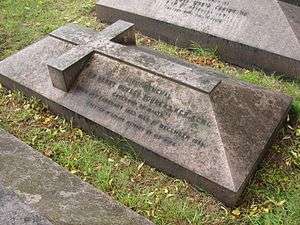Henry Torrens
| Sir Henry D'Oyley Torrens | |
|---|---|
_-_Google_Art_Project.jpg) Photograph by Felice Beato, 1858–1859 | |
| Born | 24 February 1823 |
| Died | 1 December 1889 |
| Allegiance |
|
| Service/branch |
|
| Years of service | 1849 - 1889 |
| Rank | Lieutenant General |
| Battles/wars |
Crimean War Indian Mutiny |
| Awards |
Knight Commander of the Order of the Bath Knight Commander of St Michael and St George |
Lieutenant General Sir Henry D'Oyley Torrens KCB KCMG (24 February 1823 – 1 December 1889) was a British army officer and colonial governor. He was born in Meerut, India, the son of Henry Whitelocke Torrens and Eliza Mary Roberts and died in London.
Military career
Torrens was commissioned as a second Lieutenant in the Royal Welsh Fusiliers in 1849.[1] His rise through the ranks was very rapid, reaching the rank of Colonel in 1864.[2]
He served in the Crimean War at the major battles, for which he was awarded the Légion d'honneur,[3] followed by service in India during the Indian Mutiny in 1857.
He was promoted to Major-General in 1869 and finally to Lieutenant-General while serving as General Officer Commanding Cork District in Ireland in 1884.[4]
He went on to be was Governor of Cape Colony in 1886 and Governor of Malta in 1888. He was a keen golfer founding both Royal Cape Golf Club in 1886 and Royal Malta Golf Club in 1888.

He died on 1 December 1889 and is buried in Brompton Cemetery in London.
References
- ↑ The London Gazette: no. 21020. p. 2854. 18 September 1849. Retrieved 29 May 2010.
- ↑ The London Gazette: no. 22873. p. 3503. 12 July 1864. Retrieved 29 May 2010.
- ↑ The London Gazette: no. 21996. p. 1574. 1 May 1857. Retrieved 29 May 2010.
- ↑ The London Gazette: no. 25314. p. 488. 1 February 1884. Retrieved 29 May 2010.
| Political offices | ||
|---|---|---|
| Preceded by Sir Leicester Smyth |
Governor of Cape Colony 1886–1888 |
Succeeded by Sir Henry Smyth |
| Preceded by Sir Lintorn Simmons |
Governor of Malta 1888–1889 |
Succeeded by Sir Henry Smyth |
| ||||||||||||||